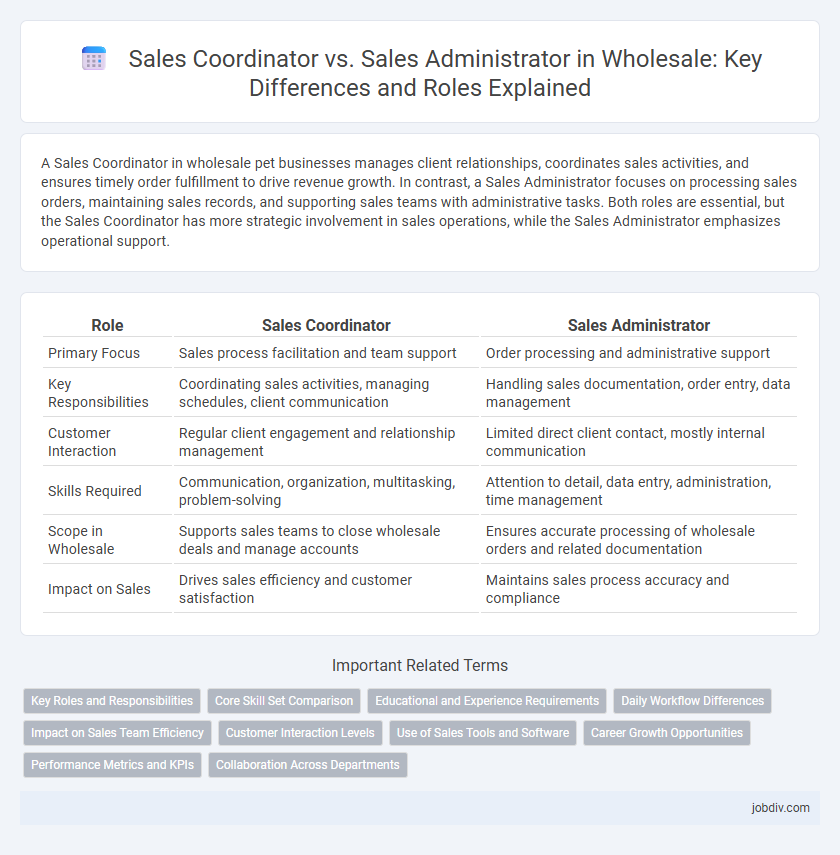A Sales Coordinator in wholesale pet businesses manages client relationships, coordinates sales activities, and ensures timely order fulfillment to drive revenue growth. In contrast, a Sales Administrator focuses on processing sales orders, maintaining sales records, and supporting sales teams with administrative tasks. Both roles are essential, but the Sales Coordinator has more strategic involvement in sales operations, while the Sales Administrator emphasizes operational support.
Table of Comparison
| Role | Sales Coordinator | Sales Administrator |
|---|---|---|
| Primary Focus | Sales process facilitation and team support | Order processing and administrative support |
| Key Responsibilities | Coordinating sales activities, managing schedules, client communication | Handling sales documentation, order entry, data management |
| Customer Interaction | Regular client engagement and relationship management | Limited direct client contact, mostly internal communication |
| Skills Required | Communication, organization, multitasking, problem-solving | Attention to detail, data entry, administration, time management |
| Scope in Wholesale | Supports sales teams to close wholesale deals and manage accounts | Ensures accurate processing of wholesale orders and related documentation |
| Impact on Sales | Drives sales efficiency and customer satisfaction | Maintains sales process accuracy and compliance |
Key Roles and Responsibilities
Sales Coordinators primarily manage communication between sales teams and clients, ensuring order accuracy and timely delivery coordination, while Sales Administrators focus on maintaining sales records, processing invoices, and supporting internal sales processes. Sales Coordinators handle customer inquiries, track order progress, and assist in resolving sales issues, whereas Sales Administrators oversee documentation, update CRM systems, and prepare sales reports. Both roles are essential in wholesale operations, streamlining sales workflows and enhancing customer satisfaction through efficient order and data management.
Core Skill Set Comparison
Sales Coordinators excel in client communication, order processing, and coordinating between sales teams and logistics to ensure timely delivery. Sales Administrators specialize in data management, sales reporting, and maintaining customer databases with strong organizational skills for smooth sales operations. Both roles require proficiency in CRM software and Microsoft Excel, but Sales Coordinators emphasize interpersonal skills while Sales Administrators focus on administrative accuracy.
Educational and Experience Requirements
Sales Coordinators typically require a bachelor's degree in business, marketing, or a related field, along with 2-3 years of experience in sales or customer service within wholesale environments. Sales Administrators often need a diploma or associate degree in business administration and at least 1-2 years of experience handling sales support tasks, order processing, and customer communication. Proficiency in CRM software and strong organizational skills are essential qualifications for both roles to ensure efficient sales operations and client relationship management.
Daily Workflow Differences
Sales Coordinators in wholesale manage client communications, coordinate order processing, and monitor shipment schedules to ensure timely delivery. Sales Administrators focus on maintaining sales records, preparing reports, and handling invoice processing to support the sales team's operational efficiency. The daily workflow of Sales Coordinators centers on external coordination and problem-solving, while Sales Administrators handle internal administrative tasks to streamline sales operations.
Impact on Sales Team Efficiency
Sales Coordinators streamline communication between sales representatives and clients, enabling faster order processing and issue resolution, which directly boosts the sales team's efficiency. Sales Administrators manage essential paperwork, data entry, and compliance tasks, ensuring smooth workflow and reducing administrative burdens on sales staff. Together, these roles optimize operational efficiency by allowing sales teams to focus more on customer engagement and revenue generation.
Customer Interaction Levels
Sales Coordinators often engage directly with customers, managing inquiries, resolving issues, and facilitating communication between clients and internal teams to ensure smooth order processing. Sales Administrators primarily handle behind-the-scenes tasks such as order entry, data management, and documentation, with limited direct customer interaction. High customer interaction levels distinguish Sales Coordinators by requiring strong communication skills, while Sales Administrators focus on operational efficiency within wholesale sales processes.
Use of Sales Tools and Software
Sales Coordinators typically manage customer interactions and sales order processing, utilizing CRM software and order management systems to streamline communication and track client accounts. Sales Administrators focus on supporting sales teams by maintaining sales data accuracy, generating reports, and handling documentation through ERP systems and sales analytics tools. Both roles rely heavily on integrated sales software, but Coordinators emphasize client-facing tools while Administrators prioritize backend data management and reporting platforms.
Career Growth Opportunities
Sales Coordinators in wholesale typically experience faster career growth due to their direct involvement in client interactions and order management, allowing for skill development in negotiation and customer relations. Sales Administrators primarily focus on internal support tasks such as processing orders and managing sales data, which can limit exposure to strategic sales roles but provides strong organizational skills valuable for operational advancement. Moving from Sales Administrator to Sales Coordinator is a common pathway that enhances career prospects by combining administrative expertise with active sales engagement.
Performance Metrics and KPIs
Sales Coordinators typically track performance metrics such as sales growth, client acquisition rates, and order accuracy to optimize revenue generation and customer satisfaction. Sales Administrators focus on KPIs like invoice processing time, order fulfillment rates, and data entry accuracy to ensure smooth operational workflow and support sales teams efficiently. Both roles use CRM analytics and real-time sales data to monitor key indicators that drive wholesale sales performance.
Collaboration Across Departments
Sales Coordinators facilitate seamless collaboration across departments by aligning sales strategies with marketing, logistics, and customer service teams. Sales Administrators support this integration by managing sales documentation and communication flow, ensuring accuracy and efficiency. Both roles are essential in wholesale environments to optimize cross-functional teamwork and drive revenue growth.
Sales Coordinator vs Sales Administrator Infographic

 jobdiv.com
jobdiv.com